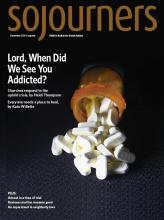JoAnn Flett decided at a young age that she loved both spreadsheets and Jesus. After more than 20 years of senior accounting and management experience, she now directs the masters in business administration program at Eastern University, a theologically informed curriculum with a strong sense of social justice that equips students with business acumen to serve God and society through business. She sat with Sojourners senior associate editor Julie Polter in June to tell her story.—The Editors
When we think of the church and business, we tend to think of them at opposite ends of a spectrum. We often think of businesspeople as a certain kind of person, one that doesn’t conjure up the best images of humanity.
I was privileged, early on, to have friends who were very successful business leaders. What drew me to them was that they were people whose faith mattered to them; they led their organizations without making a big fanfare about this, but they were leading from a faith perspective.
I admired that they ran successful companies that transformed their employees, their business partners, and their local communities. But nobody seemed to celebrate them in their local churches. It’s easy to think of teachers and nurses, people in the “helping professions,” as doing God’s work. Yet there are people of faith who lead powerful and influential organizations. These people go to work and make critical decisions, and their faith has all kinds of implications about how they live in the world, but their work is not being affirmed on Sunday.
Read the Full Article

